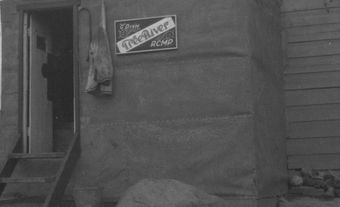Burglary
The term "burglary" no longer names a Criminal Code offence, although the activities formerly so labelled remain crimes. Burglary and related activities were recognized as offences early in the development of English COMMON LAW. Many common law rules were embodied in pre- and post-Confederation statutes, and were subsequently incorporated into the 1892 Criminal Code. Until shortly after Confederation, some burglary offences were punishable by death.
The Criminal Code now recognizes several "break and enter" and related offences; defines "break," "enter," and "place"; and provides certain evidential rules for prosecutions.
Section 348 of the Criminal Code establishes the main modern prohibitions against burglary. It creates 3 indictable offences: a) breaking and entering a place with intent to commit an indictable offence therein; b) breaking and entering a place and committing an indictable offence therein; and c) breaking out of a place after committing an indictable offence therein or after entering the place with intent to commit an indictable offence therein. If the offence was committed in relation to a dwelling-house, the maximum sentence is life imprisonment; otherwise, the maximum sentence is 14 years.
The Criminal Code establishes offences for activities related to burglary. Anyone who, without lawful excuse, entered or was in a dwelling house with intent to commit an indictable offence, is guilty of an indictable offence with a maximum sentence of 10 years' imprisonment. Other offences include possession of break-in instruments, wearing a disguise with intent to commit an indictable offence, and the unauthorized sale, purchase or possession of automobile master keys (including lock picks).
See also ROBBERY.

 Share on Facebook
Share on Facebook Share on X
Share on X Share by Email
Share by Email Share on Google Classroom
Share on Google Classroom

